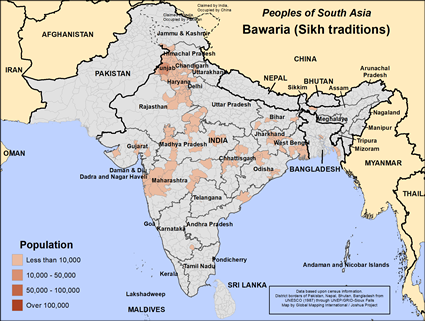Bawaria (Sikh traditions) in India

Photo Source:
Dimitris Vetsikas - Pixabay
|

Map Source:
People Group data: Omid. Map geography: UNESCO / GMI. Map Design: Joshua Project.
|
| People Name: | Bawaria (Sikh traditions) |
| Country: | India |
| 10/40 Window: | Yes |
| Population: | 109,000 |
| World Population: | 109,000 |
| Primary Language: | Punjabi, Eastern |
| Primary Religion: | Other / Small |
| Christian Adherents: | 0.00 % |
| Evangelicals: | 0.00 % |
| Scripture: | Complete Bible |
| Ministry Resources: | Yes |
| Jesus Film: | Yes |
| Audio Recordings: | Yes |
| People Cluster: | South Asia Sikh - other |
| Affinity Bloc: | South Asian Peoples |
| Progress Level: |
|
Introduction / History
The Sikh Bawaria or Bawariya are a people who live across north and central India. There are also Hindus and Muslims in this people. Their name comes from the word for "net or noose" in Hindi. According to Bawaria legends, they were Rajputs or nobles before the coming of the Moghuls. The Muslims defeated them and they were banished to the forests where they became hunters, trappers and gatherers.
Now the Bawaria are viewed as outcastes by Indian society. They are considered a Scheduled caste in which they are eligible for special public jobs and extra university admissions.
Today most Sikh Bawaria are employed in agriculture. They cultivate land owned by higher castes. They grow wheat, millet, vegetables, fruit and sugarcane. Many Bawaria are illiterate. Some educated Bawaria work as administrators, teachers, attorneys and businessmen. The primary language of the Sikh Bawaria is Eastern Punjabi. Many also speak Hindi.
A high percentage of the Sikh Bawaria live in the Indian state of Punjab. Smaller groups live in other states across the nation of India.
What Are Their Lives Like?
Some Bawaria live a seminomadic lifestyle. They harvest products and animals from a forest and move on to another place.
A Sikh Bawaria may choose to eat meat or not to eat meat. At Sikh temples only dairy products and plant based foods are served.
The Sikh Bawaria marry only within their group but they will not marry someone in their particular clan or family. Bawaria may live in multi-caste villages where they will live in their own section.
A caste council promotes their interests and settles legal disputes among Bawaria.
What Are Their Beliefs?
Guru Nanak Dev who lived in the 15th century was the originator of Sikhism. He rejected the Hindu caste system, taught all people were equal and that all have equal access to God. The Sikh God is formless, without gender and to be found in everyone. One gets closer to God by living a good life and by practicing charity. Like Hindus, Sikhs believe in reincarnation and the law of karma, you reap what you sow in your previous life. Sikhs have a reputation of being some of the finest soldiers in the Indian army. A Sikh is not allowed to use alcohol, illegal drugs or tobacco.
A Sikh man may be recognized by his turban. All the Sikh gurus wore turbans. Sikh teaching mandates that a person not cut his or her hair and wear a ceremonial dagger at all times.
What Are Their Needs?
The Sikh Bawaria must come to see that the true God is found in Jesus Christ and the Bible not in the teachings of Guru Nanak Dev. The Bawaria need to see Christ lived out before them in practical ways. They would benefit by workers coming to them to help their children learn how to read and write. Since some of the Bawaria are illiterate, the gospel will have to be presented to them in oral form.
Prayer Points
Pray that God creates a hunger for the Word of God among the Bawaria.
Pray the Lord will start a movement of Sikh Bawaria families experiencing God's blessings.
Ask God to deliver families and communities within the Bawaria people from fears that hinder them from embracing his blessings.